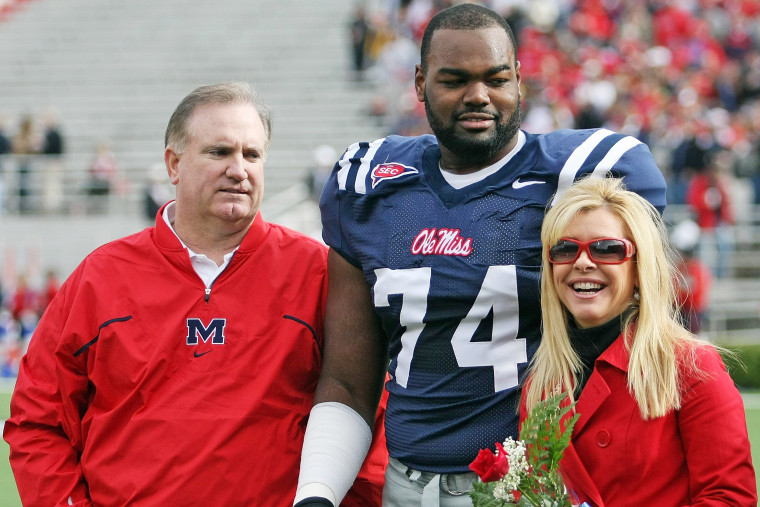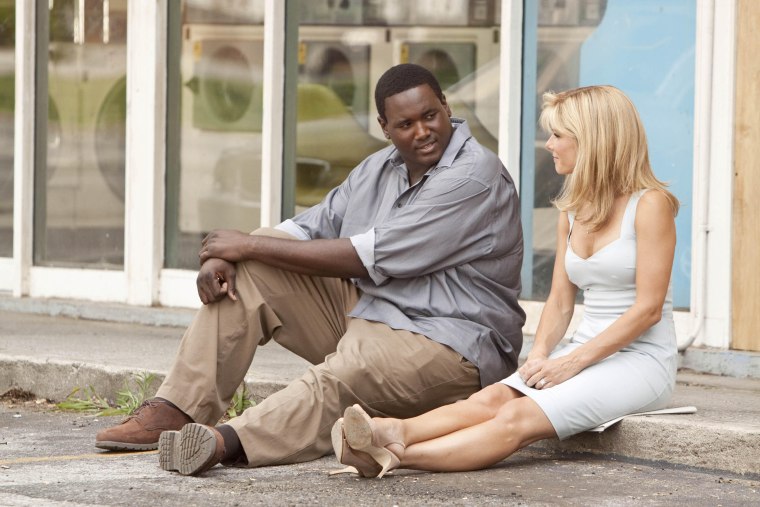The producers of “The Blind Side” are speaking out for the first time since Michael Oher accused Sean and Leigh Anne Tuohy of withholding his portion of the proceeds made from the film.
Broderick Johnson and Andrew Kosove, co-founders and co-CEOs of Alcon Entertainment, which financed the movie, detailed in a statement obtained by NBC News on Aug. 24 the payouts to the Tuohys and Michael Oher for the 2009 movie.
The pair denied that the Tuohys were paid millions by their company for the film, sharing that Alcon paid “$767,000 to the talent agency that represents the Tuohy family and Michael Oher (who, presumably, took commission before passing it through).” A source close to the film told NBC News the Tuohys received about $700,000 to be evenly split among the family.
On Aug. 14, Oher filed a petition seeking to end a conservatorship, alleging that he signed the conservatorship papers thinking they were adoption papers . In the filing, he alleged that he discovered six months ago that the Tuohys never adopted him and rather became his conservators.
Lawyers for the Tuohys said that Oher was always aware that he wasn’t legally adopted and even wrote about it in his 2011 memoir, “I Beat The Odds: From Homelessness, to The Blind Side, and Beyond.”
In a new Aug. 21 court filing, the former NFL star accused Sean and Leigh Anne Tuohy of keeping nearly two decades of financial information from him. He asked the court to have them provide a full accounting of the profits they made from “The Blind Side.”

Johnson and Kosove, on their end, said that they felt it was important for them to speak out after Oher’s lawsuit against the Tuohys made way for media reports to mischaracterize and post “uninformed opinions” about the film.
The pair said that “The Blind Side” — starring Quinton Aaron as Oher and Sandra Bullock as Leigh Anne Tuohy — “is verifiably authentic and will never be a lie or fake, regardless of the familial ups and downs that have occurred subsequent to the film.”
They added that “scores of trusted individuals,” including Michael Lewis, author of the book on which the film is based, “have spoken of their first-hand knowledge of the authenticity of the Tuohys loving Michael dearly and raising Michael as their son through the end of high school, and then throughout college and onto the NFL.”
TODAY.com reached out to Lewis for comment but did not hear back. However, he told The Washington Post that the Tuohys “showered [Oher] with resources and love. That he’s suspicious of them is breathtaking. The state of mind one has to be in to do that — I feel sad for him.” Oher did not comment on Lewis’ remarks.
According to Box Office Mojo, “The Blind Side” made more than $309 million at the box office. The film earned Bullock an Oscar for best actress.
The producers explained how the rights to Lewis’ book and associated rights contracts were negotiated by “Twentieth Century Fox and inherited by Alcon when the film was put in turnaround.” The film would go on to be released by Warner Bros. They also pointed out that in 2006, contracts and “the limitations of what college athletes were able to do and maintain eligibility, were very different than they are today.”

“The deal that was made by Fox for the Tuohys and Michael Oher’s life rights was consistent with the marketplace at that time for the rights of relatively unknown individuals. Therefore, it did not include significant payouts in the event of the film’s success,” they said.
“As a result, the notion that the Tuohys were paid millions of dollars by Alcon to the detriment of Michael Oher is false,” they added, before sharing how much Alcon paid the talent agency that represented the Tuohys and Oher.
“We anticipate that the Tuohy family and Michael Oher will receive additional profits as audiences continue to enjoy this true story in the years to come,” they continued. “In addition to these contractual payments, Alcon made a charitable contribution to the Tuohy family foundation. We offered to donate an equal amount to a charity of Mr. Oher’s choosing, which he declined.”
TODAY.com reached out to Oher following Johnson and Kosove’s statement but did not hear back. The Tuohys declined to comment.
Read Broderick Johnson and Andrew Kosove’s full statement below:
As the Co-Founders and Co-CEOs of Alcon Entertainment, the company that financed “The Blind Side”, as well as being two of the movie’s producers, we feel it is now important for us to respond to some recent media reports, which include many mischaracterizations and uninformed opinions. The impetus for these stories has been a lawsuit by Michael Oher, which seems to have given critics and journalists alike a justification to unfairly pick apart the movie fourteen years later — some going so far as to call it “fake” or a “lie.”
“The Blind Side” was a film that no major studio would make, back when Alcon financed the film in 2009. The prevailing “wisdom” was that a football movie starring a woman would not appeal to football fans, it had too much football to appeal to families, and that movies starring Black actors don’t work overseas. Our opinion was that it would appeal to everyone, and, in 2009, when this country, and the world more broadly, was more hopeful and less divided — it did. The two of us are the longest-running interracial business partnership in the history of the film industry. We have led not through publicity or pontification, but rather through the quiet power of example.
In the story of “The Blind Side” we saw the better angels of human nature. We saw it in the Tuohy’s wonderful acts of kindness toward Michael Oher. However, more importantly, we saw it in the extraordinary courage that Michael Oher demonstrated in accepting the Tuohys’ generosity not as a handout, or as his saviors, but as a way through which he could improve his own life. Michael’s academic accomplishments and athletic achievements demonstrate this. His raising of his own children now, who shall know a life of possibility the likes of which Michael never knew as a child, is the ultimate testament to Michael’s own strength and courage. In both of those regards, “The Blind Side” is verifiably authentic and will never be a lie or fake, regardless of the familial ups and downs that have occurred subsequent to the film. Indeed, scores of trusted individuals, not the least of whom is Michael Lewis, one of our country’s most respected writers and journalists and the author of the book “The Blind Side”, have spoken of their first-hand knowledge of the authenticity of the Tuohys loving Michael dearly and raising Michael as their son through the end of high school, and then throughout college and onto the NFL.
We also want to speak to the business side of the equation, which it seems, in part, is where some of the current antipathy in the press toward the film is sourced. The film rights to Michael Lewis’s book, and the associated rights contracts were negotiated by Twentieth Century Fox and inherited by Alcon when the film was put in turnaround. It is important to note that in 2006, the nature of life rights deals for books, documentaries and film, as well as the limitations of what college athletes were able to do and maintain eligibility, were very different than they are today. Comparing them to today’s marketplace for those rights is akin to comparing a basketball Hall of Famer’s deal from 25 years ago to the nine-figure deals that are prevalent in today’s NBA. The deal that was made by Fox for the Tuohy’s and Michael Oher’s life rights was consistent with the marketplace at that time for the rights of relatively unknown individuals. Therefore, it did not include significant payouts in the event of the film’s success.
As a result, the notion that the Tuohys were paid millions of dollars by Alcon to the detriment of Michael Oher is false. In fact, Alcon has paid approximately $767,000 to the talent agency that represents the Tuohy family and Michael Oher (who, presumably, took commission before passing it through). We anticipate that the Tuohy family and Michael Oher will receive additional profits as audiences continue to enjoy this true story in the years to come. In addition to these contractual payments, Alcon made a charitable contribution to the Tuohy family foundation. We offered to donate an equal amount to a charity of Mr. Oher’s choosing, which he declined.
In November, it will be 14 years since “The Blind Side” was released by our distribution partner, Warner Bros. Looking back, the two of us passionately believed that ‘The Blind Side’ was a story that should be told. John Lee Hancock had done a brilliant job adapting Michael Lewis’ book and we knew John Lee would direct a thoughtful and uplifting film. Furthermore, we believed that the amazing Sandra Bullock’s work as a dramatic actress was underappreciated, and we thought Quentin Aaron’s screen test was a revelation. Goodness knows, the two of us are hardly correct all the time, but we sure were right about our decision to make this film. The best human characteristics displayed in “The Blind Side” might be easy to dismiss in the bizarro world of elitist film critique and social media cynicism. However, in the real world, they form the basis of a healthy society and they ought to be celebrated. We are as proud of the film today as we were when our amazing collaborators made the movie 14 years ago. We hope our fellow filmmakers all over the world will continue to look for uplifting stories to tell, and have the freedom and empowerment to have their voices heard.
